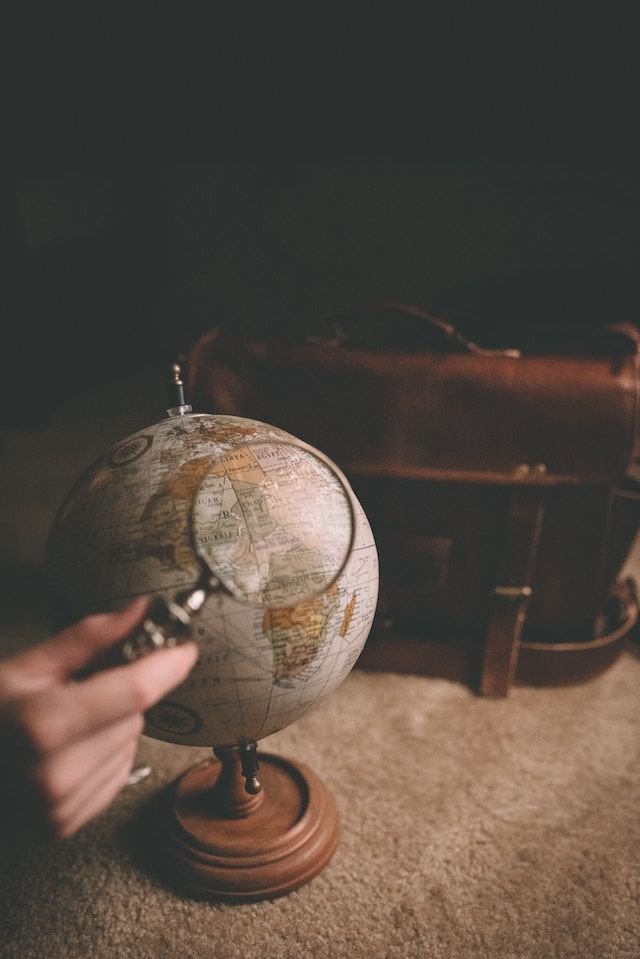WHAT IS REALITY? A SYSTEMIC VIEW OF LIFE - Part Two
TRAPPED I am NOT in this world of WORDS. That is only I want to SAY.
In part one I talked about some significant aspects of the systemic view of the world; the interconnection between living systems, good and bad feedback-loops and in particular about "certainty" and "trust". I also pointed out that there is no such thing than objectivity and that every ones view on the world is particularly subjective.
In this article, besides other topics, I am focusing on the milestones "birth" and "death" within our human existence. I am drawing a connection between the two and technological standards as well as liability issues. I also include comments and exchanges from former discussions (thank you people for engaging). Secondly, I focus on the problematics of "definitions".
The systemic approach offers to see correlations between events from a holistic point of view. It includes feedback loops and their delays. Like, what started a hundred years ago effects us nowadays and what is done today will have an effect on living systems in the far future.
there is space travel thousands of years later.
Some readers pointed out that in order not to fall into the trap of taking this circular view too much into one's life I should talk also about relativism and nihilism. For a while, I asked myself why I should do that. Because for me it is obvious that all living systems are interconnected and influence each other directly and indirectly. In acknowledging this as an objective fact I have an approach to work with. What has relativism or nihilism to do with that?
Until recently I didn't know or if I knew it, I forgot what "nihilism" means and that there is such a thing at all. I was made aware of this term several times by an exchange with others. I have read through the definition and have to say that I have problems imagining it. In my experience of people, I have never seen a nihilist before - and if I did, I probably wouldn't have recognized him as such.
The German Wiki says: "Nihilism is generally described as a worldview that denies the possibility of any objective order of being, cognition, value, and society."
Taking myself as a reference some people tend not to understand me. Now, as nihilism encountered my mind I could be tempted to use it against someone else and get angry when this person "doesn't get it". But when nihilism has no meaning to this person it is of not much use to make it real for him or her. As sciences and the attached knowledge enter the realm of some they don't enter those of others. There will always be delays and also carelessness about what is known at all.
The danger of ANY systems of thoughts
So nihilism and relativism can have to do with systemics to serve as a bridge how one gets it wrong. I find it a useless debate to label someone like this and that because it presents itself as absolute. There is no absolutism in people, those definitions deliver the temptation to reduce complexity.
The systemic worldview does not rely on thoughts as its main source, it takes thoughts to navigate through changing living systems. Though it is scientifically researched and explained through text it indeed criticises understanding the world from a textbook. Any thought system is dangerous, be it linear or cyclic. It can spread easily and it can be understood totally otherwise.
When I don't apply thinking to the physical matters of all living beings and the earth itself than my thoughts are having the potential to damage my mental health. The less I take my concepts into my relational interactions the better.
Otherwise, I won't be sure about my encounters. I would tend to over-analyze other people and I will tend to see living systems as a mere delivery source of products and services. I will divide everything and investigate it under the microscope for its use.
Though cyclic thinking can lead to confusion about what is wrong and what right when it's only attached to thinking and not to the physical world (empathy) as well.
Why do I talk about empathy as "physical"?
I do it because feelings are attached to my body. I smell, touch, see and hear through my senses and only with them, I can relate empathetically to living systems. Thought is another "sense", my mental realm is my servant but should never be my master.
My conclusion is that I need a (subjective) physical reference point to find an objective view and vice versa. To make it easy I take a living system: a tree. I state: Trees deeply depend on fish. What? Why is that? I won't give you an explanation, I guess you take this on by intuition.
To understand the matrix I have to understand (my) single case
At a certain point, one has to make up his decision and act or react. Within the moral codes of my society and what most people hold as consensus, it would be immoral not helping a creature in need.
In one of my articles, I had a very good exchange about a situation where I stopped a woman from gunfire talking because I saw it was needed to calm her down. Otherwise, she would have gotten into stress trance. To wait in insecurity if my perception might be wrong and stay indifferent towards her could be taken as relativism. Interestingly, I was questioned if I was not projecting my assumption on her and denying the client an insight to figure it out for herself. Fear is another feeling of being wrong and impose a hasty intervention against another one.
I answered: "If someone is about to drown in front of you and gasps hard, would you think it would be wrong to save him because it could be the case that he would stay afloat?"
What people do instead of taking care of their microcosmos
is that they expand their thoughts into the bigger scheme and want to take care of everything and everyone. This can only be done by great machinery and "grand scale solutions". That is what I face today. It makes sense to start the other way around and check if what is given, counts for me and my direct social and physical realm, my daily life.
As I am not a biologist or genetic engineer I cannot understand the science behind it other than I myself I am a biologist in exactly this field. Checking I can only the outcomes of DNA engineering and ask myself very personal questions, like:
Am I ready to stretch my lifespan? Can I say yes to altering the human biology and that of other living systems like crops and animals? If I decide to decide against it I will no one allow questioning my personal decision for it is crucial to me to find my ground. In this loop of events, I follow my ethics which make sense to me. Knowing, that they do not necessarily make sense to others.
But of course, I am subjectively critical for the very reason that I do not want to feel isolated with my view of the world and connect with the far and near group.
Worship of the machine
I would like to talk today about this exaggeration of worshiping machines and the Zeitgeist to which I feel exposed.
It is a fact that machines determine our everyday life and we want to rely on them. Since I will not go into the positive aspects of machines, but rather take a consciously critical look at my modern civilization, I do not want to comment on praise for machine technology as a supplement to this article. I would like to clarify something with this post, which in my opinion receives very little attention. For this purpose, it is essential to read the interview with Heinz von Förster, which is linked here. Without having read it, there is no point in wanting to understand my article.
For me - and certainly for many others as well - it is clear that the statements made by contemporary scientists on the criticism of science and the faith in technology have long since been formulated extremely well. Nevertheless, it is necessary to translate the knowledge into one's own consciousness and the present reality in which everyone lives and to deal with it. To ask yourself: Where does this apply to the world in which I exist?
"Modern people use their bodies to transport their brains to the next meeting"
Quote by Sir Ken Robinson
I'm a social worker and systemic consultant. I deal in large numbers with the physical and psychological side effects of machine and related influence.
My own strongest experiences were the birth of my son and the death of my mother. I believe that with the advanced use of mechanical and computer technology, people feel compelled and forced to ignore their biological bodies. Not really wanting to have a body. Aging, in particular, makes people feel that they are experiencing pain in many places that they never had during their youth. But young people also negate their healthy bodies because they see them as a functionary and want to keep them fit and healthy in view of the fact that they will grow old and ugly. Hardly anyone thinks that the body as it is is good. Do we actually think in terms other than health and prevention and pain reduction and recovery?
I support this statement with the fact that in modern civilizations, most people do not work with the body but try to solve problems by thinking. Since we no longer work the soil ourselves, do not physically touch and produce the matter we need for life, our actions are limited to the mental work and to transport our bodies to the places of thought.
In particular, I see the machine influence taking hold of the two most important milestones of human existence, as I said: birth and death.
In my country, 98% of births take place in a clinic,
and the possibility of a home birth or one in a birth centre is disappearing because the work of freelance midwives is made impossible by the high liability insurance payments. This means that pregnant women no longer have a choice and are limited to hospital births. The degree of mechanization and the structures of personnel in maternity hospitals demand a similar degree of adaptation from pregnant women. The number of interventions is high, especially has risen in the area of cesarean section births, which here in Hamburg are 36 %. From what WHO recommends it is far away, which is 10%.
It is to be feared that interventions will become habitually established and natural vaginal obstetrics will be forgotten, as the risks are seen as too high for doctors and midwives in case something goes wrong. They are more and more associated with the fear towards high sums of compensation[1]. However, complete documentation is essential for the insurance companies and therefore every pregnant woman must be connected to the equipment that is considered necessary for this documentation. The focus is no longer on the biological and spiritual process of birth, but on electronic birth monitoring. As far as I know, women can still refuse to be connected to any monitoring but what if they cannot choose that any longer?
I asked myself: is there any documentation about vaginal birth without any intervention whatsoever? The answer is: yes, partly. But it is not looked at and it does not play a role. Any guess what those observations would tell us about the quality of birth? How will we know how births without interventions will be when we are not having them? The skills from generations of midwives are such a huge asset!
Dying looks similar.
Death patients are cared for in intensive care units while the human attention has decreased significantly, the latest technologies have become the standard in hospitals, and the staff is often an economic factor, as are the patients. Insofar as a terminally ill person or the deceased person is not yet too old, he or she is considered for organ donation, which in turn is subject to insurance and liability issues, as well as strict scheduling and the obligations of transplantation medicine. If a very old person dies, his bed is immediately cleared and the opportunity for close relatives to say goodbye at their own pace.
The similarities are striking. So little is born at home, so little is died at home.
"Security" seems to give us modern man the machines that either prolong life, exchange a life for dying and treat the moments of birth and death as self-contained events. Which they are not.
From what I see the correlation between the two "death" and "birth" are there. Without presenting a number I would guess that not only 98 % of modern people were born in hospitals but also die in hospitals in the same degree or heading towards it. Life is like a sandwich between the two. It became sugary and fat for us industrialized people and it became a thin slice of bread for those of who we think of having still to "develop".
There might also be a correlation between the birth rates themselves of industrialized countries and so-called second and third worlds. I can very well imagine that the decrease of births in my world and the high number of births in poor countries will paint a similar picture. Those are two extremes and they are extreme for the very reason that humankind is in the midst of a feedback loop on a grand scale. One possible feed I consider the actions of colonization times turning people into slaves (invading indigenous people) from which whole countries still try to recover. At the same time, of course, the mixed together folks had positive influences on each other as well. Very complex, indeed.
However, arriving and departing are events that are not self-contained.
We also notice this by the way how lost we feel when we enter a foreign country without having someone there to greet us, where a social connection takes place, to get accustomed to the new circumstances through the care of others.
Nor can we simply accept the disappearance of relatives. For example, we lack something very essential if we don't have a dead body for a dead person. The physical presence of death is crucial in order to perceive it not as an image but as real.
This bettering of the world, "augmentation" and computerization does not give humankind a better life all over. In some parts it does in others it doesn't. Stretching life as well as being seen as an economic factor has its negative outcomes besides the positive ones. Why should all people on earth lead a similar life? Us modern people have long since arrived in that visioned better world. Have you noticed? We're in the loop. It does not lay ahead. The past was not better and neither was it worse. It was another form of perceiving life in that circle, it was what we think what it was which means what you think from your present perspective.
What about the covered and agricultural used land in modern civilizations?
How much soil is still available for plants & animals without being cultivated? Without taking the overwhelmingly numerous statistics into account I would make the same guess, at least heading towards the almost hundred percent in time and space. If you would collect all existing statistics in the world into a computer you still would miss the great picture which is "quality". On a quality level, I can see the flaws but I hardly see them on a quantitative level. I lack the capacity to understand and will crack my head. For some people, the holy grail is to build an artificially intelligent computer matrix to "know it all". All knowledge and all mapping should be seen as just models and concepts. I admit though it is fascinating to map quality as Peter Kruse tried to do.
Knowing is not quality, it's quantity.
How much tribe-population is left on earth? Anthropologists and ethnologists will tell you how valuable those remaining tribes are in order to learn something from them because their being and thinking don't fit into our own concept of life, yet can be seen as great eye openers to withdraw wisdom. I read and saw a documentary about the "Mossou", a tribe which has such a different clan structure that they also could be aliens.
Humberto Maturana says in the introduction of his book The Biology of cognition:
Man knows and his capacity to know depends on his biological integrity; furthermore, he knows that he knows. As a basic psychological and, hence, biological function cognition guides his handling of the universe and knowledge gives certainty to his acts; objective knowledge seems possible and through objective knowledge the universe appears systematic and predictable. Yet knowledge as an experience is something personal and private that cannot be transferred, and that which one believes to be transferable, objective knowledge, must always be created by the listener: the listener understands, and objective knowledge appears transferred, only if he is prepared to understand. Thus cognition as a biological function is such that the answer to the question, 'What is cognition?' must arise from understanding knowledge and the knower through the latter's capacity to know.
While reading through the pages and trying to wrap my head around it I got nevertheless angry. I wanted to throw all explanations and concepts out of the window. I was remembering my son being born from me and my mother to whom I gave my last escort. And I compared it with brain births. Millions and millions of pages where the mind gives birth to it's ideas. I saw the struggle in it and I got frustrated by this huge effort to find a definition for the obvious. But then I calmed down and I saw that exactly happened what he talks about. Understanding comes from a very subjective perspective and my experiences of life differ from his experiences. He offers his, I offer mine.
Heinz von Förster, considered a leading figure of cybernetics, was asked in another Interview (translated from German - Heise online):
"What could a definition of cybernetics, which was also fundamental for the development of artificial intelligence, look like? What is cybernetics?"
Heinz von Foerster: "I'm not particularly pleased with the search for a definition because in this way a conceptual boundary is always created. You could also ask me: What is a table? And my answer would be: A table has four legs and a flat lid on which children can jump. Now we have to figure out the difference between a table, a pony, and a horse. And finally, it becomes necessary to talk about the difference between living beings and non-living entities. That's what we get out of it. For me, each definition has a fundamental weakness: it excludes, it limits."
The limitation is what makes it weak. In order not to limit it people approach the "being understood" differently, for instance by using symbolism and art. They are letting thought behind them and express the unthinkable in physical forms of communication. To witness a child being born is a strong act of communication. It happens beyond words and thinking. To witness a dying person to inhale and exhale for the last time shows another form of understanding living systems.
Interviewer: And yet it makes sense to sort out the variety of definitions that are currently circulating. To give a few examples: The mathematician Norbert Wiener has the statement that cybernetics is the science of regulation and communication in living beings and machines. The business and management consultant Stafford Beer defined cybernetics as the science of organization; the neuro-philosopher Warren McCulloch spoke of cybernetics as a theory of knowledge that deals with the generation of knowledge through communication. "Cybernetics is a way of thinking, not a collection of facts." And Gordon Pask wrote even more generally: "It might be an art, or a philosophy, a way of life."
Heinz von Foerster: First of all I would like to express my enormous joy that such a wonderful rainbow comes to light in this small collection of determination attempts. This speaks in favour of thinking that allows for a variety of approaches. The width of the possible and this looseness form a great stimulus. It turns out that it is about an attitude that each of these people interprets in his own way. This is the fascination of cybernetics: You ask a few people about a definition - and learn very little about cybernetics, but a lot about the person defining it, his specialty, his relation to the world, his desire to play with metaphors, his enthusiasm for management, his interest in communication or message theory.
The temptation to rip this text and the interview apart
to find it's flaws will be successful when I give in. Language and text itself are only one place to search. But there are countless others, too. I can find them in music, paintings, dance, sculptures. I can see them in the current of the ocean, in a feather, a leave, the house of a snail, a bee-hive, the wind lifting up leaves from the street and spiral them by it's little hose. I can look at the ground in a forest to imagine how much under the earth live is spreading and doing its work. I look up the sky by night and can imagine the Signature of Spheres.
Once I got a sense of systems I see them everywhere. I get a bad feeling when I put organic next to inorganic matter into the trash can. It doesn't fit together. It doesn't go back into its circle but is getting burned. I see that there is actually no waste in nature. All of what is goes back into the cycle of birth and death - it goes from cradle to cradle. And yet what we produce is waste.
Respect life and you can respect death as well. Not only respect it but ...
Celebrate Complexity.
Let’s face it, the universe is messy. It is non-linear, turbulent, and chaotic. It is dynamic. It spends its time in transient behaviour on its way somewhere else, not in mathematically neat equilibria. It self-organizes and evolves. It creates diversity, not uniformity. That’s what makes the world interesting, that’s what makes it beautiful, and that’s what makes it work. Only part of us, a part that has emerged recently, designs buildings as boxes with uncompromising straight lines and flat surfaces. Another part of us recognizes instinctively that nature designs in fractals, with intriguing detail on every scale from the microscopic to the macroscopic.
Donella Meadows
Finally
I find it utterly inappropriate to rush the processes of birth and death as if they have to get over with quickly. It's a mistaken and false approach to drop the attached rituals. It is careless to think that people can do without them.
I find it neccessarry to integrate birth and deaths again in our daily life's
so they can be sensed fully in all their beauty & un-beauty. Hospitals, homes for the elderly or other social institutions need to be stripped off shareholders or their shared interests of return on investments. As only the latter seems to be possible the policies have to change. People need people who are not stressed and feared to give support entering the milestones of life.
Apart from science and any documentation and evaluation, I would like you to get in touch with babies and dead corpses. Feel, explore the difference between reality in your mind and reality in reality.
Thank you for reading.
I want to thank you deeply for all who are engaging directly and indirectly with this topic, either in contact with me, having an exchange, a debate or even a disagreement. Openly or silently. Which I appreciate a lot once I overcome some feelings of anger and frustration. All of you whom I followed through your articles, be it STEM-related or not are taking a great influence on me. You inspired and aggravated me, made me laugh and cry, you gave me nevertheless a feeling of connection. As there would be so many names to list, I leave that out. And I hope you understand.
"Before the Beginning"
[1]: NIH Consensus Development Conference on Vaginal Birth After Cesarean: New Insights: "Health care organizations, physicians, and other clinicians should consider making public their trial of labor policies and VBAC rates, as well as their plans for responding to obstetric emergencies. We recommend that hospitals, maternity care providers, health care and professional liability insurers, consumers, and policymakers collaborate on the development of integrated services that could mitigate or even eliminate current barriers to trial of labor.
We are concerned that medical-legal considerations add to, and in many instances exacerbate, these barriers to trial of labor. Policymakers, providers, and other stakeholders must collaborate in developing and implementing appropriate strategies to mitigate the chilling effect the medical-legal environment has on access to care."
Text sources
-Part one: https://steemit.com/steemstem/@erh.germany/what-is-reality-a-systemic-view-of-life-part-one
-Relativism: https://en.wikipedia.org/wiki/Relativism
-Nihilism: https://en.wikipedia.org/wiki/Nihilism
-Interview with Heinz von Förster:https://web.stanford.edu/group/SHR/4-2/text/interviewvonf.html
-Meaning: https://en.wikipedia.org/wiki/Meaning - searching result of it before chosing a sub-category (the sub-categories became more over time. Any predictions?)
-Matrix: https://en.wikipedia.org/wiki/Matrix - searching result of it before chosing a sub-category
-Complexity: https://en.wikipedia.org/wiki/Complexity/
- Sir Ken Robinson: https://en.wikipedia.org/wiki/Ken_Robinson_%28educationalist%29)
-My article on births (TLTR): https://steemit.com/live/@erh.germany/happy-birthday-science-fiction-is-today
-Reports of women having natural vaginal births: https://www.self.com/story/12-women-share-what-its-like-to-have-a-natural-birth
-German documentation about births out of clinics: http://quag.de/quag/factsinenglish.htm
-My article about organ donation (TLTR): https://steemit.com/life/@erh.germany/organ-donation-when-is-a-person-really-dead
-Peter Kruse: https://en.wikipedia.org/wiki/Peter_Kruse
-Humberto Maturana - The Biology of cognition: http://www.enolagaia.com/M70-80BoC.html
-Heinz von Förster: https://en.wikipedia.org/wiki/Heinz_von_Foerster
-German Interview Heinz von Förster: https://www.heise.de/tp/features/Wir-sehen-nicht-dass-wir-nicht-sehen-3446178.html
-Circular economy/ cradle to cradle - Living in a world without waste: https://en.wikipedia.org/wiki/Circular_economy
-Donella Meadows recommendations for how to dance with systems: https://medium.com/@designforsustainability/donella-meadows-recommendations-for-how-to-dance-with-and-intervene-in-systems-92ace21743fb
Picture credit from up to down
Photo by Bryan Minear on Unsplash
Photo by Jon Moore on Unsplash
Photo by Clay Banks on Unsplash
Photo by Ella Jardim on Unsplash
Photo by Huyen Nguyen on Unsplash
Photo by Will van Wingerden on Unsplash







Being A SteemStem Member
This is another side to your writing altogether. Highly cerebreal and specific - the interview with dear Heinrich goes too far off our common track, for me, I apologise, especially since you touch upon things that are very exciting but do not really come alive for you yet - that heartfelt and holistic understanding of systems, which opens up an entirely new way of seeing, I call "belief" (not in a churchy or new agey way). It was helpful to me (a former Nihilist!) to discover we have 12 senses and how we are trapped in loops, circles and endless cycles. Only in spirals and through metamorphosis can we transcend our unknowing. Yes, we need a brain to know that, but no less so a three part soul with its higher faculties of thinking, feeling and willing (which are not brain steered, but independent and can only be harnassed by an overviewer who is completely objective in their independence (The I Am). We are saying the same thing, I believe, when it comes to the danger of abstraction.
I admire your academic prowess, and make a note to self, that I am fast fading in comparison!
Then again, I think I agreed a while back with myself that I could give up such methodical thinking at menopause, to allow the etertnally feminine to shine, at last. I am a little older than you, and this helps me very much to accept I really may be arriving at that point that Ican put all my arguments to one side and simply sit with a calm smile. (No way near that stage, yet!). It might help me much to know I can leave the philosophising to you for now!
somehow this comment of yours went under.
But I want to reply as it is worth it:) - yes, it's somehow funny how one perceives the other. When I talk from my heart and feelings I got the response that I should argue more analytical. When I am rational and logical I get the response that it's cerebral. I feel like a bridge between the disciplines and I let people walk on that bridge as I am capable of more than just one language. In the sense of picking people up where they stand. To some people, it's really confusing and they don't believe me when I appear to one person as an academic and to another person as a working-class human.
It could be taken as a "lie". Of course, it's not as every human is having different facets and can be in resonance with different people and their facets.
I can curse like a horse-drawn carriage driver and I can have a sophisticated dialogue with an academic. Nothing really special about that. When I am in the presence of a woman, like you, I can be the younger one and learn from your already gained wisdom. In fact, I believe one should stay in touch with the younger and the older ones and not so much only with peers.
But the roles must nevertheless be in order (which is a systemic view and also, I guess, a Buddhist one). It is out of order when I compete with younger males. That feels inappropriate. I can give them my experience and also I feel to have the right to point my advantage of life experience in years. I like to direct young males to other, older or younger males. I am careful not to be too sassy in front of the elderly because that again is inappropriate. This mistake I made in my youth and it caused many heart- and headaches.
So what you read here contributes to the scientific realm as I think it's good at times to mingle with the respected faculties and stir them a little. They wouldn't take me seriously when I publish in "life" or "love" or "spirituality". But of course, you know that and I write that also down for other readers who might have scrolled down the comment section.
So actually, we cannot compare us to one another but take on what we have to offer in exchange.
I am all for a fruitful friendship. :)
P.S. Good, that you gave up on nihilism
Let me show you something interesting:
Therefore logical conclusion would be that:
a) Defining godlike being is an attempt to limit unlimited (which is quite absurd on its own) - should we call everything that has no limits God?
b) Being unlimited is also a limit, which then means (if, "The limitation is what makes it weak.") limitation and lack of it are both not desirable - that may explain why we usually see something in between and never corner solutions (some limits and some freedom)
Also 2 bonuses:
a) Waste is a relative word, to understand what I mean - Earth don't care about global warming
b) World strives for complexity and as complexity grows the fragility increases (imagine living without electricity - but it also applies to things like atoms)
Thank you, Sim.
a.) Yes, why not? We are having already a name for it, why change it? Anyway, this is not something which should be forced or determined. It will fade out anyway and new names will probably be invented.
b.) thank you for pointing that out. yes, and there where I personally want a limit and don't want one I have to stop my circulating and make up my mind. (at least made some rounds and looked at a "problem" from all kinds of directions and time-spaces)
People care about climate and such. And they should. But careful and not substituting one miserable solution with another miserable solution. I recommend reading the cradle to cradle concept.
Totally so! Complexity is linked to fragility.
a) I didn't mean to change it, I meant rather there are things that have no limitations and we don't call them God, for example mathematical infinity
I definitely agree that people should care about climate. What I was pointing out is that Earth is literally a rock and doesn't care about anything. People define what is waste and what is not - therefore should preserve habitable environments for their own sake.
Cheers :)
that makes me thinking ... a name for something which cannot be understood by nouns or definitions is hard to find. Name finding is defining and that is maybe the whole problem. From what I think actually, no human believes truly and intuitively in a personal God. But to be able to communicate the word is taken as if there is a person behind creation. I am all for skipping to find that out, why and how the universe came into being. We won't find out anyway so why bother? The mystery is unsolvable. It's only because we have so much leisure time to ponder those philosophical questions meanwhile the worldly tasks are getting neglected.
... ah well, I know you understand.
Am still trying to get hold of what this means. Trying to understand it perfectly. This is a well written article at least i learnt a word from it even though am trying to understand its meaning.
Thank you. The more words you learn the more it gets you to connect them to all the other words and definitions. ;-) what a task.
Exactly sir. One just has to keep learning an important thing i gain on steemit KNOWLEDGE!.
Nice.
Thanks:) I hope you are well.
Ja, danke. Hatten wir über den Mönch gesprochen? Er kommt im Mai.
ja, du hast das erwähnt. Bist du im Discord Chat zu erreichen?
Wenn Du mich adden kannst sende ich Dir meine Tel.Nr. OK?
https://www.facebook.com/KulturNavi
gemacht :-)
Congratulations! Your post has been selected as a daily Steemit truffle! It is listed on rank 24 of all contributions awarded today. You can find the TOP DAILY TRUFFLE PICKS HERE.
I upvoted your contribution because to my mind your post is at least 10 SBD worth and should receive 49 votes. It's now up to the lovely Steemit community to make this come true.
I am
TrufflePig, an Artificial Intelligence Bot that helps minnows and content curators using Machine Learning. If you are curious how I select content, you can find an explanation here!Have a nice day and sincerely yours,

TrufflePig